- CLASSIC MAGAZINES
- REVIEW CREW
A show recapping what critics thought back
when classic games first came out! - NEXT GENERATION'S BEST & WORST
From the worst 1-star reviews to the best
5-stars can offer, this is Next Generation! - NINTENDO POWER (ARCHIVE)
Experience a variety of shows looking at the
often baffling history of Nintendo Power! - MAGAZINE RETROSPECTIVE
We're looking at the absolutely true history of
some of the most iconic game magazines ever! - SUPER PLAY'S TOP 600
The longest and most ambitious Super NES
countdown on the internet! - THEY SAID WHAT?
Debunking predictions and gossip found
in classic video game magazines! - NEXT GENERATION UNCOVERED
Cyril is back in this spin-off series, featuring the
cover critic review the art of Next Generation! - HARDCORE GAMER MAGAZING (PDF ISSUES)
Download all 36 issues of Hardcore Gamer
Magazine and relive the fun in PDF form!
- REVIEW CREW
- ELECTRONIC GAMING MONTHLY
- ELECTRONIC GAMING MONTHLY RANKS
From Mario to Sonic to Street Fighter, EGM
ranks classic game franchises and consoles! - ELECTRONIC GAMING MONTHLY BEST & WORST
Counting down EGM’s best and worst reviews
going year by year, from 1989 – 2009! - ELECTRONIC GAMING BEST & WORST AWARDS
11-part video series chronicling the ups and
downs of EGM’s Best & Worst Awards!
- ELECTRONIC GAMING MONTHLY RANKS
- GAME HISTORY
- GAME OVER: STORY BREAKDOWNS
Long-running series breaking down game
stories and analyzing their endings! - A BRIEF HISTORY OF GAMING w/ [NAME HERE]
Real history presented in a fun and pithy
format from a variety of game historians! - THE BLACK SHEEP
A series looking back at the black sheep
entries in popular game franchises! - INSTANT EXPERT
Everything you could possibly want to know
about a wide variety of gaming topics! - FREEZE FRAME
When something familiar happens in the games
industry, we're there to take a picture! - I'VE GOT YOUR NUMBER
Learn real video game history through a series
of number-themed episodes, starting at zero! - GREAT MOMENTS IN BAD ACTING
A joyous celebration of some of gaming's
absolute worst voice acting!
- GAME OVER: STORY BREAKDOWNS
- POPULAR SHOWS
- DG NEWS w/ LORNE RISELEY
Newsman Lorne Riseley hosts a regular
series looking at the hottest gaming news! - REVIEW REWIND
Cyril replays a game he reviewed 10+ years
ago to see if he got it right or wrong! - ON-RUNNING FEUDS
Defunct Games' longest-running show, with
editorials, observations and other fun oddities! - DEFUNCT GAMES QUIZ (ARCHIVE)
From online quizzes to game shows, we're
putting your video game knowledge to the test!- QUIZ: ONLINE PASS
Take a weekly quiz to see how well you know
the news and current gaming events! - QUIZ: KNOW THE GAME
One-on-one quiz show where contestants
find out if they actually know classic games! - QUIZ: THE LEADERBOARD
Can you guess the game based on the classic
review? Find out with The Leaderboard!
- QUIZ: ONLINE PASS
- DEFUNCT GAMES VS.
Cyril and the Defunct Games staff isn't afraid
to choose their favorite games and more! - CYRIL READS WORLDS OF POWER
Defunct Games recreates classic game
novelizations through the audio book format!
- DG NEWS w/ LORNE RISELEY
- COMEDY
- GAME EXPECTANCY
How long will your favorite hero live? We crunch
the numbers in this series about dying! - VIDEO GAME ADVICE
Famous game characters answer real personal
advice questions with a humorous slant! - FAKE GAMES: GUERILLA SCRAPBOOK
A long-running series about fake games and
the people who love them (covers included)! - WORST GAME EVER
A contest that attempts to create the worst
video game ever made, complete with covers! - LEVEL 1 STORIES
Literature based on the first stages of some
of your favorite classic video games! - THE COVER CRITIC
One of Defunct Games' earliest shows, Cover
Critic digs up some of the worst box art ever! - COMMERCIAL BREAK
Take a trip through some of the best and
worst video game advertisements of all time! - COMIC BOOK MODS
You've never seen comics like this before.
A curious mix of rewritten video game comics!
- GAME EXPECTANCY
- SERIES ARCHIVE
- NINTENDO SWITCH ONLINE ARCHIVE
A regularly-updated list of every Nintendo
Switch Online release, plus links to review! - PLAYSTATION PLUS CLASSIC ARCHIVE
A comprehensive list of every PlayStation
Plus classic release, including links! - RETRO-BIT PUBLISHING ARCHIVE
A regularly-updated list of every Retro-Bit
game released! - REVIEW MARATHONS w/ ADAM WALLACE
Join critic Adam Wallace as he takes us on a
classic review marathon with different themes!- DEFUNCT GAMES GOLF CLUB
Adam Wallace takes to the links to slice his way
through 72 classic golf game reviews! - 007 IN PIXELS
Adam Wallace takes on the world's greatest spy
as he reviews 15 weeks of James Bond games! - A SALUTE TO VAMPIRES
Adam Wallace is sinking his teeth into a series
covering Castlevania, BloodRayne and more! - CAPCOM'S CURSE
Adam Wallace is celebrating 13 days of Halloween
with a line-up of Capcom's scariest games! - THE FALL OF SUPERMAN
Adam Wallace is a man of steel for playing
some of the absolute worst Superman games! - THE 31 GAMES OF HALLOWEEN
Adam Wallace spends every day of October afraid
as he reviews some of the scariest games ever! - 12 WEEKS OF STAR TREK
Adam Wallace boldly goes where no critic has
gone before in this Star Trek marathon!
- DEFUNCT GAMES GOLF CLUB
- DAYS OF CHRISTMAS (ARCHIVE)
Annual holiday series with themed-episodes
that date all the way back to 2001!- 2015: 30 Ridiculous Retro Rumors
- 2014: 29 Magazines of Christmas
- 2013: 29 Questionable Power-Ups of Christmas
- 2012: 34 Theme Songs of Christmas
- 2011: 32 Game Endings of Christmas
- 2010: 31 Bonus Levels of Christmas
- 2009: 30 Genres of Christmas
- 2008: 29 Controls of Christmas
- 2007: 34 Cliches of Christmas
- 2006: 33 Consoles of Christmas
- 2005: 32 Articles of Christmas
- 2004: 31 Websites of Christmas
- 2003: 29 Issues of Christmas
- 2002: 28 Years of Christmas
- 2001: 33 Days of Christmas
- NINTENDO SWITCH ONLINE ARCHIVE
- REVIEW ARCHIVE
- FULL ARCHIVE
Unchained Blades
The PSP has long been the home for some of the best modern role-playing games. From must-own modern remakes like Tactics Ogre and Persona 3 Portable, incredible original titles like Crisis Core and Valkyria Chronicles II, and a collection of strong PlayStation-era RPGs (Final Fantasy VII, Vagrant Story, etc.), the PSP has the strongest library of adventure games of any system. Now, even after the PS Vita has taken its place, the PSP is still attracting niche role-playing games, like Unchained Blades, Xseed's newest portable outing.
Unchained Blades is a traditional Japanese role-playing game through and through. The game hits all of the cliches, including random battles, a nonsensical storyline, busty anime girls, an emo hero, old-fashioned turn-based combat and hours of tedious grinding. If it wasn't for the PlayStation 2-quality graphics, you might think this was a port of a Super NES adventure game.
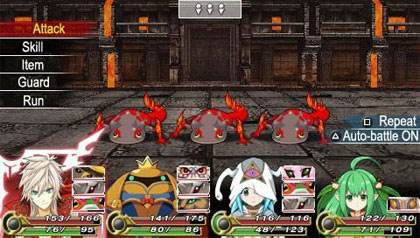
You play Fang, a cocky dragon who has gotten used to his life as an immortal. One day his powers are taken from him and he's reduced to being a mere teenage boy with questionable style. Fang is filled with anger and will do whatever it takes to claw his way back up to his former glory. But he can't do it on his own. In order to survive the many challenges, Fang will need to make friends and work as a team to take down titans and save the day.
In true role-playing game fashion, you lead a band of characters through dungeons and towers. The action is told from the first-person point of view, similar to classic adventure games like Phantasy Star and Double Dungeons. The map fills in with each step you take, forcing players to be thorough in order to find safe camp sites, treasure chests and other hidden goodies. But stay vigilant, because you never know when a random battle will strike.
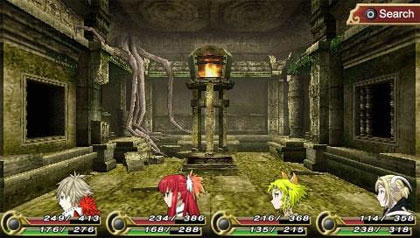
The combat will be instantly familiar to anybody who has played an old school Final Fantasy game. Each side takes turns setting up an attack plan, which can involve special skill attacks, magic abilities and more. Or, if you're low on health, you can use items to take care of your wounded characters in the middle of battle. It's all fairly standard territory for Japanese role-playing games.
Unchained Blades does offer a few additions to the regular turn-based action. For one thing, you'll be forced to battle several pages of bad guys at once. The game isn't afraid to throw a dozen or more bad guys at you, which means that players will need to use the left and right shoulder buttons to flip between several groupings of enemies. This adds a lot of strategy to the battles, especially late in the game and with multi-sectional boss battles.
As you overpower your opponent, the game will give you an option to unchain the enemy. This throws the player into a simple mini-game involving flipping the allegiance of the bad guy. Convert him to a follower and you'll be able to use that character in battle. Each party member can equip four followers, who will in turn defend you against attacks and go on the offensive when needed. Best of all, your followers will level up with each battle, leading to bigger and stronger monster buddies.
From time to time you'll need to prove your worth with judgment tests. These battles put your followers up against another group, turning Unchained Blades into something that resembles a rhythm game. You use the D-pad's up, down, left and right buttons when called and do what you can to keep spirits high. The game may throw a quick time event at you, or even have the player mash the "X" button as fast as possible. All this to see who can defeat the other side first.
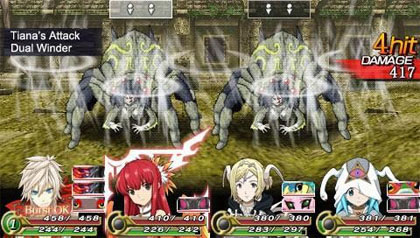
All this can be a lot of fun when you get the hang of it. The combat isn't terribly complicated and the upgrade path is near identical to what Square has been doing in recent Final Fantasy games. It may not have a lot of bells and whistles, but Unchained Blades seemed like a solid role-playing game that would be easy to recommend to fans of the genre. And then, out of nowhere, the game pushes the reset button.
Right after you defeat your first titan (a gigantic three screen tall monster), the game switches perspectives to a brand new trio of adventurers. This new group is led by an attractive half-bird/half-woman character. She's set out to prove that she's capable of more, which, in this case, involves taking two female friends into mortal danger. For the next fifteen hours you work these characters up from level one until they too take down a titan (a multi-leveled tortoise).
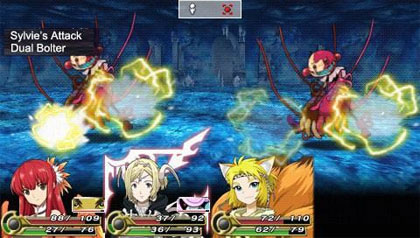
This is one of the most deflating moments in video game history. I had just spent a good fifteen hours working Fang's team of misfit monsters and busty anime babes up to level 20, maxing out the followers and learning all sorts of new skills and magic spells. I had taken how an enormous monster, the type of thing four lowly adventurers should not be able to kill. What should have been the best moment of the game was suddenly interrupted with the realization that I would have to do it all over again.
I balked. Here I am with a trio of women who have very little money, bad gear, zero followers and no worthwhile skills. There's not even a healer in the bunch. It's up to you to do it all over again, all for what feels like no good reason. You spend the next fifteen hours grinding through a new batch of levels, picking up new equipment, battling new bad guys, leveling up your characters and snatching up followers. The people and places may be different, but you've done this all before.
There comes a point where I started to forgive Unchained Blades. Maybe this new group isn't that bad. Their storyline is more interesting and they're way more useful than Fang's party. And even though I'm going through the same motions, eventually these two parties are bound to get back together and form one unstoppable group. Even though the switch is jarring, maybe it's not that bad after all.
And just like that, the game pulls the exact same trick. After beating the second titan, players are introduced to yet another brand new character. Just like before, we spend the next few hours building his experience and grinding through levels. It's maddening. Every time I feel like I'm making progress in the game, the storyline rips me away for no good reason. Eventually everybody does meet up, but by that point I had far too many battle scars to care about any of these characters.
Beyond the game's weird penchant for pushing the reset button, Unchained Blades also has a number of other problems worth pointing out. I'm not a big fan of the game's lengthy, unskippable conversations. Here we hear horribly written dialog delivered in the least exciting way possible. It's not that the voice acting is bad; it's just not very enthusiastic. Or, at some points, it's too enthusiastic. The actors never quite capture the moment and the writing left me rolling my eyes. The fact that you can't skip these lengthy bits is criminal.
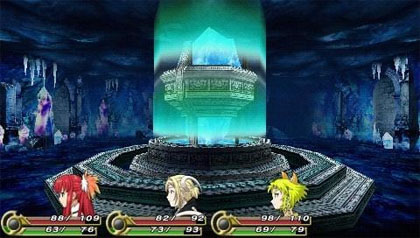
The graphics aren't bad, but they certainly aren't the best the PlayStation Portable can offer. The game's various levels aren't that interesting, either. Even with flooding basements and spikes on the floors, the stages themselves feel incredibly generic. And because the game switches the point of view so many times, I found it impossible to sympathize with any of the main cast.
Incidentally, this brand new PSP game is not compatible with the PS Vita. It seems unfathomable that a game released months after the Vita's launch would not be compatible, but no matter which way I try, this PSN download only works on the PSP. It's disappointing to say the least.
This is the perfect example of a good game marred by one really terrible design decision. In the case of Unchained Blades, my one issue is hard to overcome. It robs the player of any forward momentum and makes it difficult to truly get to know these characters. It also means you have to do a lot of needless busywork, the most monotonous parts of the role-playing experience. In the end it's not worth it, which is why this otherwise solid role-playing game is hard to recommend.
HOME |
CONTACT |
NOW HIRING |
WHAT IS DEFUNCT GAMES? |
NINTENDO SWITCH ONLINE |
RETRO-BIT PUBLISHING
Retro-Bit |
Switch Planet |
The Halcyon Show |
Same Name, Different Game |
Dragnix |
Press the Buttons
Game Zone Online | Hardcore Gamer | The Dreamcast Junkyard | Video Game Blogger
Dr Strife | Games For Lunch | Mondo Cool Cast | Boxed Pixels | Sega CD Universe | Gaming Trend
Game Zone Online | Hardcore Gamer | The Dreamcast Junkyard | Video Game Blogger
Dr Strife | Games For Lunch | Mondo Cool Cast | Boxed Pixels | Sega CD Universe | Gaming Trend
Copyright © 2001-2025 Defunct Games
All rights reserved. All trademarks are properties of their respective owners.
All rights reserved. All trademarks are properties of their respective owners.































